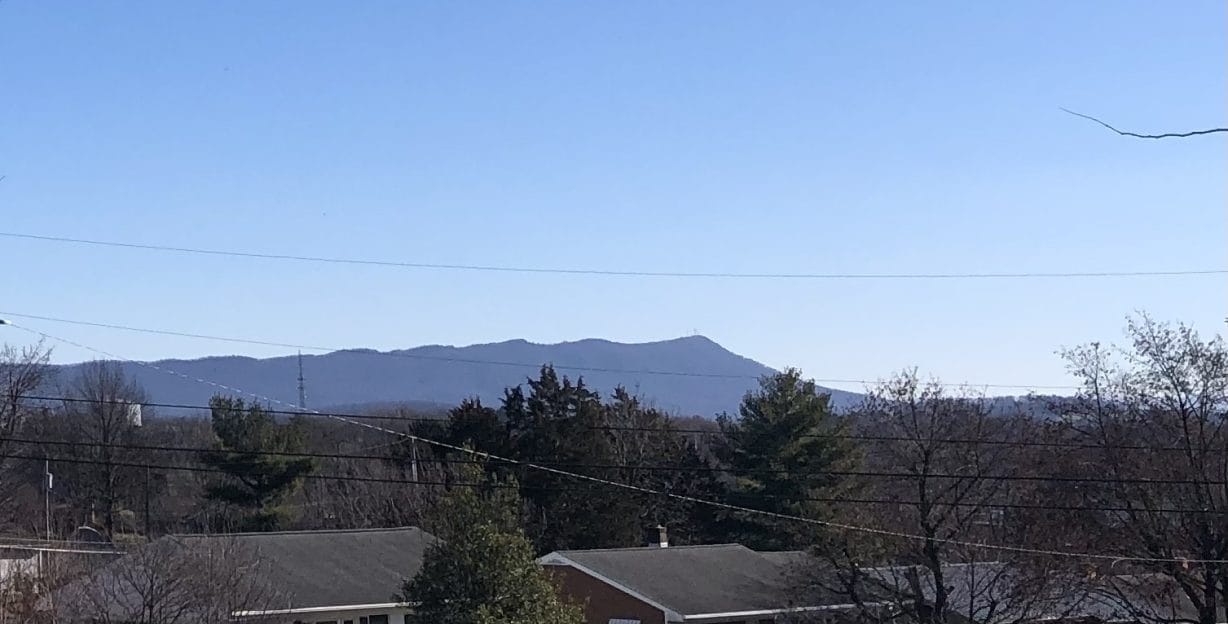
By Sofia Samatar
“The Friendly City” is a weekly column about walking in Harrisonburg that will run during 2024. Each week, your friendly correspondent, writer and teacher Sofia Samatar, will reflect on a walk in our city.
Anyone can write about a large city—large cities are open to everyone—but small cities can only be portrayed by people who love them.
For the first outing of the year, choose your favorite walk, on a brilliant January day, the streets flooded with white-gold light. Go up one of those shaggy little gravel alleys, among the backyards, where the city reveals its most modest and intimate side. How fantastic it is to walk here, among the clotheslines and leaning ladders, the cheerful disarray of overturned pots and jumbles of plastic containers! There’s a homey feel to the sheds, some painted red to look like miniature barns, others overgrown with thick, bristling ivy. An ear of dried corn hangs on a fence for birds and squirrels to pick at. Windchimes ring on the eaves. Swing sets and trampolines creak in the cold. Sunlight gilds everything, raising a fuzzy glow from a rough old tree and a gleam from a motorcycle parked on the grass. Then a cloud drifts across the sun, the chill deepens, you button your coat, but soon you’re warm again, because you’re walking uphill. For this is a hilly city, a patchwork of slopes and rises, where you never have to go far to see the mountains.
This is how you should enjoy your first walk. Maybe it’s an afternoon walk, because you’ve waited until the warmest part of the day. Someone’s been trimming a pine tree: feathery branches lie in the yard. You breathe the clean evergreen scent and the richer, brown smell of moldering piles of leaves. There aren’t many people around at this hour, the children are still at school, the adults at work, but you, you’re walking, it’s the time when convalescents go out, the hour of people who march on the doctor’s orders, of university professors fortunate enough to enjoy a long vacation, of retired people, of unemployed people, of artists, of pastors who discover a free afternoon, of people who work from home and can slip out when no one else is around. But where are all these imagined walkers? You come across no one but a man washing a van, who raises a hand in accordance with the culture of the city. You respond with your own brief wave. At the corner you pass a small memorial: a wooden cross nailed to a telephone pole, adorned with pink fabric roses.
A dog starts barking at you, and then all the dogs join in, their hoarse cries strung from yard to yard. They fade as you enter an absolutely silent neighborhood, one that seems new because the trees are small and the houses formidably tidy, all neat brick and spotless siding. You’re going uphill again, and it’s just quiet, there’s nothing happening, and you feel as if nothing ever happens here, and you realize that of course the Friendly City, like any place on earth, will be different for different people. There will be people who find this stillness dull, perhaps unbearable, who long for the action and romance of urban centers, and others whose experiences have taught them to treasure this silence, who cling to the hush of this town where you can hear the trees stirring in the breeze. For these, there may be solace in the bare branches with the birds’ nests exposed, the empty lawns in their drab winter yellow, the houses that all seem to have their eyes shut, the faint sound of traffic from Highway 42, and farther off, almost imperceptible, the monotonous buzz of a saw.
At the top of the hill, a vista opens: suddenly you’re above the trees, face to face with the indigo ridge of Massanutten. You think of Novalis, the eighteenth-century German Romantic poet, who identified distance with poetry. Everything becomes poetic with distance, Novalis said: distant mountains, people, philosophies, and events. A shift in perspective transforms everything. For Novalis, this was no cheap illusion, but a key to the deepest level of human experience. And even though you know there’s nothing very romantic down below—gas stations, a livestock auction, a branch of the poultry plant—you’re enchanted by this glimpse through a magic mirror that makes the earth recede and enlarges the sky to a swath of watered blue silk, pale at the hem. The landscape has changed, the trees crouching down like children playing at hide-and-seek, the mountain surging proudly across the horizon. And it occurs to you that if the Friendly City has romance, it’s right here, in this ordinary and profound effect of geography: the opportunity to encounter, if just for a moment, a dramatically altered view of the world, merely by walking uphill.












